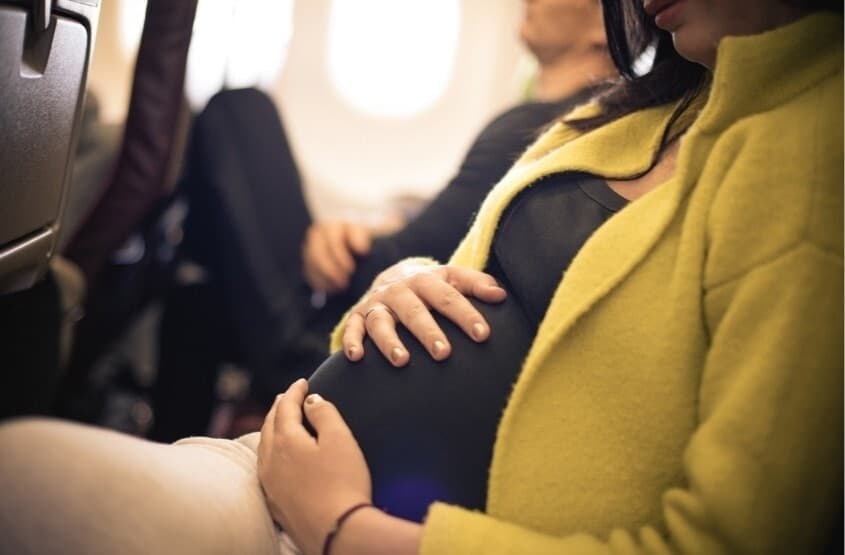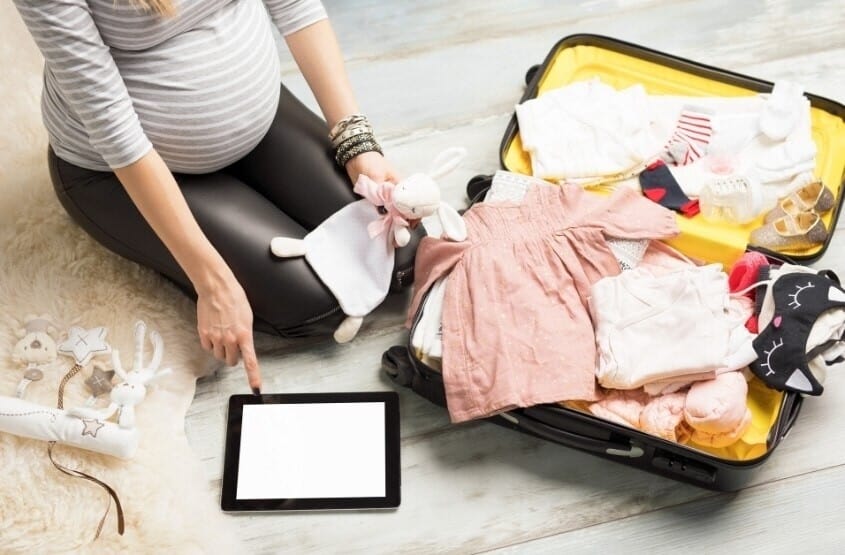Traveling To Mexico While Pregnant: Is It Worth It?
Traveling To Mexico While Pregnant: Is It Worth It?

I’ve traveled to Mexico a few times and I always notice at least a couple pregnant women either on the flight or when I arrive in Mexico, this got me thinking; should pregnant women travel to Mexico? After reading up on the matter, here’s what I learned.
Can You Travel To Mexico While Pregnant
Pregnant women are generally safe to travel until close to their due date, however, The American Society of Obstetricians and Gynecologists (ACOG) suggest not flying if you have any pregnancy or medical conditions that may be made worse by flying. If you are planning a trip to Mexico, talk with you ob-gyn.
Mexico, including the Caribbean; is known to present a risk of the Zika virus. Zika virus can be a huge concern if you are traveling to Mexico while pregnant. The Zika virus, which can be transmitted by 2 types of infected mosquitoes, as well as through sexual contact, can cause severe birth defects. Unfortunately at this time, there is no vaccination for the Zika virus.
If you travel to Mexico, make sure to schedule a test with your provider after your trip to ensure you are Zika free. It’s also recommended to avoid sexual intercourse during your pregnancy to reduce your risk of exposure to the Zika virus.
If you have already planned your trip to Mexico and discovered that you are pregnant, there are steps that need to be taken to reduce your risk of exposure to the virus.
The CDC recommends the following steps to help prevent being bit by mosquitoes while traveling:
- Staying indoors as much as possible
- Use screens on doors and windows
- Sleep under a mosquito net
- Use an EPA registered insect repellent ( Sawyer Premium 30% Deet is a popular choice on Amazon)
- If traveling to Mexico, try to plan your trip in an area with an elevation of at least 6,500 feet where mosquitoes will less prevalent
Is It Safe To Travel To Mexico While Pregnant

There are many potential concerns when traveling to Mexico while pregnant, you need to be well aware of these concerns before deciding if traveling to Mexico is safe for you.
Traveling to Mexico while pregnant is overall safe, but you should take into consideration any medical or pregnant conditions you may have. As well, always talk with your obstetrician-gynecologist before making any travel plans.
According to ACOG, flying is considered safe up until about 36 weeks of your pregnancy, your ob-gyn can provide proof of your due date if thee airline requires you to show proof before flying.
If you’re traveling to Mexico while pregnant, there are steps and other considerations you should prepare for, prior to your trip.
Steps To Take Before Traveling To Mexico While Pregnant

If you have decided that you will be traveling to Mexico at any point during your pregnancy, follow these steps before traveling:
- Visit with your ob-gyn at least 4-6 weeks before your travel date.
- Check with you airline to make sure they will allow you to fly at your stage of pregnancy. Your feet may become swollen on long flights, make sure to wear comfortable shoes and clothing. Try to get up and walk at least every hour. To reduce your risk or blood clots during travel, your doctor may recommend compression stockings and certain leg exercises you can perform while seated on the plane.
- Ensure your bring the proper gear to maintain safety and maximum comfort while traveling (check out my recommended travel gear).
- Book your trip to Mexico during the cooler seasons to avoid any intense heat. Also, mosquitoes are more active in humid weather above 80 degrees.
- Avoid staying near in areas where mosquitoes thrive, such as; jungle, tall grassy spots, areas with a large concentration of people, and water.
- Bring proper clothing to wear including a sunhat and articles that will cover your skin to help prevent against sunburn and insect bites.
The CDC recommends looking into supplemental travel health insurance if you need plan on getting care overseas (generally your US health insurance will not cover you in Mexico). As well, if you are traveling to a remote area in Mexico, an insurance policy that covers medical evacuation will pay for your transportation to a high-quality hospital in case of an emergency.
Whether you plan on a routine checkup during your trip, or expect to give birth, it’s important you are prepared and consider purchasing supplemental travel health insurance. I highly recommend World Nomads Travel Insurance if you are looking for an affordable plan, that will cover all your needs when traveling to Mexico while pregnant.
Taking the appropriate steps and knowing what to be aware of before traveling to Mexico, will help you make your trip as safe as can be.
Concerns With Traveling To Mexico While Pregnant

Other concerns you should consider when traveling to Mexico are eating or drinking contaminated food or water which may cause traveler’s diarrhea (I’ve experienced traveler’s diarrhea almost every time I visit Mexico). Traveler’s diarrhea may cause dehydration which is even more of a concern for pregnant women.
CDC recommends you follow these food and safety measures to ensure proper health:
- Only eat food that is cooked and served hot (avoid food that has been sitting at room temperature such as a buffet)
- Do not eat raw or undercooked meat or fish
- Do not drink any tap water or anything that contains ice
- Drink only beverages such as water, soda, and juices that are factory sealed
- Do not eat unpasteurized dairy products
If you do happen to get traveler’s diarrhea, make sure you drink plenty of safe liquids while you wait for it to pass on its own. Avoid taking medications containing bismuth, such as Pepto-Bismol. These medications are not recommended for pregnant women.
Check with your provider before traveling for an approved list of medications you can take in case of traveler’s diarrhea.
Ultimately, it’s up to you to determine if traveling to Mexico while pregnant is safe for you and your baby. Although there are many potential concerns you should consider before traveling, speaking with your healthcare provider and creating a proper travel plan is an important factor when considering your safety.
Is It Safe in South America?
Bonnie is a freelance writer born and raised in South America who has covered the continent for 11 years.
:max_bytes(150000):strip_icc()/GettyImages-819902996-64de60d7749e404ab5b3d7baf194cf35.jpg)
Pierre-Yves Babelon / Getty Images
South America—home of the famous Machu Picchu, Rio de Janeiro, Buenos Aires, Patagonia, and more—attracts roughly 37 million tourists per year. Naturally, due to the presence of rebel groups and its notoriously violent illegal drug trade, parts of the continent have been deemed unsafe for tourism. But even Colombia, widely avoided as a travel destination until the early aughts, has turned its reputation around in recent years. There are many places to visit in South America if you practice basic safety and stay away from certain areas and activities.
Travel Advisories
- The U.S. Department of State has issued a Level 3 Travel Advisory (“reconsider travel”) for all South American countries except Uruguay , which remains a Level 2 (“exercise increased caution”), and Argentina , Brazil , and Venezuela , all under a Level 4 (“do not travel”).
- Prior to 2020, all but one were under a Level 2 due to crime, terrorism, kidnapping, and/or civil unrest. Venezuela has been placed under a Level 4 due to “crime, civil unrest, poor health infrastructure, kidnapping, arbitrary arrest, and detention of U.S. citizens,” the advisory says .
Is South America Dangerous?
While some parts of South America have been deemed dangerous by the U.S. Department of State, much of the continent is perfectly safe to visit. Travelers are advised to avoid the entire country of Venezuela due to ongoing political instability. Parts of Colombia—Arauca, Cauca (except Popayan), Chocó (except Nuquí), Nariño, and Norte de Santander (except Cucuta)—are also under a Level 4 because of crime, terrorism, and kidnapping . In 2019, the U.S. Department of State warned of “K risks” in 35 countries following the kidnapping of American tourist Kimberly Sue Endicott in Uganda . Venezuela and Colombia were the only two South American countries on the list.
The safest places in the continent seem to be the stunning beaches of French Guiana, Uruguay, the volcano-laden nation of Chile, Suriname (South America’s smallest), Paraguay, and Argentina. Wherever you go, leave your valuables at home and travel with an abundance caution.
Is South America Safe for Solo Travelers?
South America is safe for solo travelers so long as they stick to low-risk areas and remain vigilant. Many of its cities and countries are popular tourist destinations with countless hostels frequented by the backpacker set. Solo travelers should stick to these areas—Bogota, Colombia; Jijoca de Jericoacoara, Brazil; Santiago de Chile, Chile; Mendoza, Argentina; and Rio de Janeiro, Brazil, for instance—and only travel to more remote or dangerous areas with a licensed tour guide. As with any city, solo travelers should avoid going out alone at night and taking solo taxi rides. Kidnappings happen, so use the buddy system as often as possible.
Is South America Safe for Female Travelers?
Women travel to South America all the time—often in groups, sometimes alone—and many of them return home with only positive experiences. Women’s rights are not as progressive in South America as they are in the U.S. and there are frequent reports of domestic violence in many countries; however, this doesn’t generally put female travelers at risk. Because of South America’s very macho, chauvinistic culture, women may experience cat calling or other hassle from men. What they should really keep an eye out for, though, is pickpocketing and other non-violent crime. Female travelers are vulnerable, especially when alone, so they should keep their guards up and travel in groups when possible.
Safety Tips for LGBTQ+ Travelers
Homosexuality is legal in every South American country except Guyana, where it is punishable by life imprisonment (although that rule is rarely enforced). Same-sex marriage is illegal in seven countries: Bolivia, Chile, Guyana, Paraguay, Peru, Suriname, and Venezuela. Anti-discrimination laws are in place everywhere except Guyana, Paraguay, and parts of Argentina. Travelers should know the laws of the countries they intend to visit, and try to avoid public displays of affection even where it’s legal as violence towards LGBTQ+ individuals and couples still occurs.
Safety Tips for BIPOC Travelers
Demographics vary by country—for instance, Argentina is 85 percent white whereas Suriname is primarily Black and East Indian . Bolivia is 55 percent Amerindian while 75 percent of Paraguay’s population identifies as mestizo . South America, as a whole, is a melting pot of races and ethnicities, and the vast majority of it is extremely hospitable and welcoming. That being said, racism is prevalent (as it is throughout the world), and exists in various forms. So long as BIPOC travelers stick to the tourist-centric places where locals are more exposed to diversity and are therefore more accepting, they shouldn’t encounter any trouble.
Safety Tips for Travelers
- Colombians have a saying, no dar papaya (don’t give papaya), which means “don’t be stupid,” or—in other words—don’t put yourself in a position to be taken advantage of. Travelers should walk with confidence, stay aware, and avoid looking like a target.
- Educate yourself on the current affairs of your destination and avoid demonstrations or any unrest while there.
- Keep in mind that pickpockets often work in pairs or groups. One or more will distract you while another does the stealing. or Portuguese in case of an emergency.
- Wear appropriate clothing for the locale and situation. Dress like the locals and conceal any valuable possessions (iPhones, cameras, jewelry, etc.).
- It’s always a good idea to register with your embassy or consulate before traveling abroad.
TripSavvy uses only high-quality, trusted sources, including peer-reviewed studies, to support the facts within our articles. Read our editorial policy to learn more about how we keep our content accurate, reliable and trustworthy.
U.S. Department of State. “Uruguay Travel Advisory.” November 23, 2020.
U.S. Department of State. “Argentina Travel Advisory.” August 6, 2020.
U.S. Department of State. “Brazil Travel Advisory.” August 6, 2020.
U.S. Department of State. “Venezuela Travel Advisory.” October 30, 2020.
U.S. Department of State. “Colombia Travel Advisory.” October 30, 2020.
U.S. Department of State. “Introduction of K Risk Indicator.” April 9, 2019.
Traveling To Mexico While Pregnant: Is It Worth It?

I’ve traveled to Mexico a few times and I always notice at least a couple pregnant women either on the flight or when I arrive in Mexico, this got me thinking; should pregnant women travel to Mexico? After reading up on the matter, here’s what I learned.
Can You Travel To Mexico While Pregnant
Pregnant women are generally safe to travel until close to their due date, however, The American Society of Obstetricians and Gynecologists (ACOG) suggest not flying if you have any pregnancy or medical conditions that may be made worse by flying. If you are planning a trip to Mexico, talk with you ob-gyn.
Mexico, including the Caribbean; is known to present a risk of the Zika virus. Zika virus can be a huge concern if you are traveling to Mexico while pregnant. The Zika virus, which can be transmitted by 2 types of infected mosquitoes, as well as through sexual contact, can cause severe birth defects. Unfortunately at this time, there is no vaccination for the Zika virus.
If you travel to Mexico, make sure to schedule a test with your provider after your trip to ensure you are Zika free. It’s also recommended to avoid sexual intercourse during your pregnancy to reduce your risk of exposure to the Zika virus.
If you have already planned your trip to Mexico and discovered that you are pregnant, there are steps that need to be taken to reduce your risk of exposure to the virus.
The CDC recommends the following steps to help prevent being bit by mosquitoes while traveling:
- Staying indoors as much as possible
- Use screens on doors and windows
- Sleep under a mosquito net
- Use an EPA registered insect repellent ( Sawyer Premium 30% Deet is a popular choice on Amazon)
- If traveling to Mexico, try to plan your trip in an area with an elevation of at least 6,500 feet where mosquitoes will less prevalent
Is It Safe To Travel To Mexico While Pregnant

There are many potential concerns when traveling to Mexico while pregnant, you need to be well aware of these concerns before deciding if traveling to Mexico is safe for you.
Traveling to Mexico while pregnant is overall safe, but you should take into consideration any medical or pregnant conditions you may have. As well, always talk with your obstetrician-gynecologist before making any travel plans.
According to ACOG, flying is considered safe up until about 36 weeks of your pregnancy, your ob-gyn can provide proof of your due date if thee airline requires you to show proof before flying.
If you’re traveling to Mexico while pregnant, there are steps and other considerations you should prepare for, prior to your trip.
Steps To Take Before Traveling To Mexico While Pregnant

If you have decided that you will be traveling to Mexico at any point during your pregnancy, follow these steps before traveling:
- Visit with your ob-gyn at least 4-6 weeks before your travel date.
- Check with you airline to make sure they will allow you to fly at your stage of pregnancy. Your feet may become swollen on long flights, make sure to wear comfortable shoes and clothing. Try to get up and walk at least every hour. To reduce your risk or blood clots during travel, your doctor may recommend compression stockings and certain leg exercises you can perform while seated on the plane.
- Ensure your bring the proper gear to maintain safety and maximum comfort while traveling (check out my recommended travel gear).
- Book your trip to Mexico during the cooler seasons to avoid any intense heat. Also, mosquitoes are more active in humid weather above 80 degrees.
- Avoid staying near in areas where mosquitoes thrive, such as; jungle, tall grassy spots, areas with a large concentration of people, and water.
- Bring proper clothing to wear including a sunhat and articles that will cover your skin to help prevent against sunburn and insect bites.
The CDC recommends looking into supplemental travel health insurance if you need plan on getting care overseas (generally your US health insurance will not cover you in Mexico). As well, if you are traveling to a remote area in Mexico, an insurance policy that covers medical evacuation will pay for your transportation to a high-quality hospital in case of an emergency.
Whether you plan on a routine checkup during your trip, or expect to give birth, it’s important you are prepared and consider purchasing supplemental travel health insurance. I highly recommend World Nomads Travel Insurance if you are looking for an affordable plan, that will cover all your needs when traveling to Mexico while pregnant.
Taking the appropriate steps and knowing what to be aware of before traveling to Mexico, will help you make your trip as safe as can be.
Concerns With Traveling To Mexico While Pregnant

Other concerns you should consider when traveling to Mexico are eating or drinking contaminated food or water which may cause traveler’s diarrhea (I’ve experienced traveler’s diarrhea almost every time I visit Mexico). Traveler’s diarrhea may cause dehydration which is even more of a concern for pregnant women.
CDC recommends you follow these food and safety measures to ensure proper health:
- Only eat food that is cooked and served hot (avoid food that has been sitting at room temperature such as a buffet)
- Do not eat raw or undercooked meat or fish
- Do not drink any tap water or anything that contains ice
- Drink only beverages such as water, soda, and juices that are factory sealed
- Do not eat unpasteurized dairy products
If you do happen to get traveler’s diarrhea, make sure you drink plenty of safe liquids while you wait for it to pass on its own. Avoid taking medications containing bismuth, such as Pepto-Bismol. These medications are not recommended for pregnant women.
Check with your provider before traveling for an approved list of medications you can take in case of traveler’s diarrhea.
Ultimately, it’s up to you to determine if traveling to Mexico while pregnant is safe for you and your baby. Although there are many potential concerns you should consider before traveling, speaking with your healthcare provider and creating a proper travel plan is an important factor when considering your safety.
Source https://mexicotravelbuddy.com/traveling-to-mexico-while-pregnant-is-it-worth-it/
Source https://www.tripsavvy.com/south-america-common-sense-safe-travel-1637307
Source https://mexicotravelbuddy.com/traveling-to-mexico-while-pregnant-is-it-worth-it/